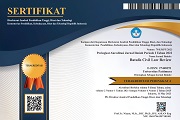Problematika Akad Nikah Via Daring dan Penyelenggaraan Walimah Selama Masa Pandemi Covid-19
 )
)
(1) Fakultas Hukum Universitas Airlangga, Surabaya, Indonesia
 Corresponding Author
Corresponding Author
Abstract
The implementation of marriages during the Covid-19 pandemic was hampered, so that there were adjustments in the marriage ceremony, in this case the marriage contract and the holding of a walimah so that it could be held. The development of increasingly sophisticated technology is the intermediary. One of them is to do a marriage contract online through a video call application. The purpose of this research is to study and analyze the validity of the implementation of online marriage contracts and the holding of walimah during the pandemic, so that a concrete solution must be found. The research method is normative legal research, with a statutory approach, conceptual approach and case approach. The results of the study show that online or online marriage contracts using internet-based video call applications cannot be permitted, this is due to the physical obligation of ittihad majelis (unified assemblies). Postponement of holding the walimah during the Covid-19 pandemic in order to avoid crowds of people, by paying attention to the principles of fiqh. The solution is for the marriage contract in the covid-19 pandemic season, which is to carry out the marriage contract in the way that the prospective groom is represented in the marriage contract process, while holding the walimah distributing food to neighbors and those in need.
Keywords
DOI
10.47268/ballrev.v1i1.387
Published
2020-11-22
How To Cite
@article{BALLREV387,
author = {Mahardika Emas},
title = {Problematika Akad Nikah Via Daring dan Penyelenggaraan Walimah Selama Masa Pandemi Covid-19},
journal = {Batulis Civil Law Review},
volume = {1},
number = {1},
year = {2020},
keywords = {Marriage Contract; Online; Walimah; Pandemic Covid-19},
abstract = {The implementation of marriages during the Covid-19 pandemic was hampered, so that there were adjustments in the marriage ceremony, in this case the marriage contract and the holding of a walimah so that it could be held. The development of increasingly sophisticated technology is the intermediary. One of them is to do a marriage contract online through a video call application. The purpose of this research is to study and analyze the validity of the implementation of online marriage contracts and the holding of walimah during the pandemic, so that a concrete solution must be found. The research method is normative legal research, with a statutory approach, conceptual approach and case approach. The results of the study show that online or online marriage contracts using internet-based video call applications cannot be permitted, this is due to the physical obligation of ittihad majelis (unified assemblies). Postponement of holding the walimah during the Covid-19 pandemic in order to avoid crowds of people, by paying attention to the principles of fiqh. The solution is for the marriage contract in the covid-19 pandemic season, which is to carry out the marriage contract in the way that the prospective groom is represented in the marriage contract process, while holding the walimah distributing food to neighbors and those in need.},
issn = {2746-8151}, pages = {68--78} doi = {10.47268/ballrev.v1i1.387},
url = {https://fhukum.unpatti.ac.id/jurnal/ballrev/article/view/387}
}
Jurnal
Faizal, B., Fathur, M., & Handar, S. B. (2019). Praktik Pencatatan Ijab Qabul Via Online dalam Proses Akad Nikah Di Makassar. PUSAKA: Jurnal Khazanah Keagamaan, 7(1), 49-62. https://doi.org/10.31969/pusaka.v7i1.241
Farid, M. (2018). Nikah Online dalam Perspektif Hukum. Jurisprudentie : Jurusan Ilmu Hukum Fakultas Syariah Dan Hukum, 5(1), 174-189. https://doi.org/10.24252/jurisprudentie.v5i2.5437
Latupono, B. (2018). Pencatatan Perkawinan Di Indonesia Dikaitkan Dengan Good Governance. SASI, 24(2), 150-160. https://doi.org/10.47268/sasi.v24i2.129
Muhajir. (2018). Studi Analisis Putusan Pengadilan Agama Jakarta Selatan No. 1751/p/1989 tentang Perkawinan Melalui Telepon. Al-Qadha, 5(1), 9-19. https://doi.org/10.32505/qadha.v5i1.956
Thalhah. (2014). Kaidah Fiqhiyah Furu'iyah: Penerapannya pada Isu Kontemporer. Tahkim: Jurnal Hukum Dan Syariah, 10(1), 67-88. https://doi.org/10.33477/thk.v10i1.64
Buku
Ahmad, I. B. U. A.-S. (2019). Al-Yaqut Al-Nafis (Ringkasan Fikih Madzhab Syafi'i), (Terjemahan Ahmad Dzulfikar). Solo: Pustaka Arafah.
Al-Bugha, M., Al-Khan, M., & Al-Syurbaji, A. (2012). Al-Fiqh al-Manhaji 'ala al-Madzhab al-Imam asy-Syafi'i (Jilid 1). (Terjemahan Misran), Yogyakarta: Darul Uswah.
Azizah, N. (2018). Haruskah ada Walimah. Jakarta: Rumah Fiqih Publishing.
Hisyam, I. (2018). As-Sirah an-Nabawiyah li Ibni Hisyam (Jilid II). (Terjemahan Fadhli Bahri), Bekasi: Darul Falah.
Kaharuddin. (2015). Nilai-Nilai Filosofi Perkawinan. Jakarta: Mitra Wacana Media.
Sarwat, A. (2017). Seri Fiqih Kehidupan: Muqaddimah. Jakarta: Rumah Fiqih Publishing.
Sarwat, A. (2019). Ensiklopedia Fikih Indonesia 8 : Pernikahan. Jakarta: Gramedia Pustaka Utama.
Online/World Wide Web
Al-Munajjid, M. S. (2013). Ruling on Doing The Marriage Contract over The Phone or Internet. Islam Question & Answer. https://islamqa.info/en/answers/105531/ruling-on-doing-the-marriage-contract-over-the-phone-or-internet
Dewi, N. S. (2020). Riset : Sinyal Jaringan Seluler Masih Belum Merata di Indonesia. Digination.Id. https://www.digination.id/read/016133/riset-sinyal-jaringan-seluler-masih-belum-merata-di-indonesia
Fua, A. A. (2020). Viral Sepasang Pengantin Menikah via Video Call gara-gara Virus Corona. Liputan6.Com. https://www.liputan6.com/regional/read/4211432/viral-sepasang-pengantin-menikah-via-video-call-gara-gara-virus-corona
Gunadha, R. (2020). Pesta Nikah saat Corona, Publik Protes Kapolsek Kembangan Cuma Dimutasi. Suara.Com. https://www.suara.com/news/2020/04/02/140835/pesta-nikah-saat-corona-publik-protes-kapolsek-kembangan-cuma-dimutasi
Kasana, M. (2020). This Open-Source Program Lets You Run Deepfakes on Live Video Calls. Input. https://www.inputmag.com/tech/open-source-program-will-let-you-run-deepfakes-on-live-video-calls
Muhajir. (2018). Studi Analisis Putusan Pengadilan Agama Jakarta Selatan No. 1751/p/1989 tentang Perkawinan Melalui Telepon. Al-Qadha, 5(1), 9-19. https://doi.org/10.32505/qadha.v5i1.956
O'Callaghan, J. (2014). Why the WRONG face? App uses real-time facial tracking to transform your appearance during live video calls. Mail Online. https://www.dailymail.co.uk/sciencetech/article-2652997/Why-WRONG-face-App-uses-real-time-facial-tracking-transform-appearance-video-calls.html
Saputra, I. Y. (2020). Pernikahan Jadi Klaster Baru Penularan Covid-19 di Semarang, Ini Kata Walikota. Solopos.Com. https://www.solopos.com/pernikahan-jadi-klaster-baru-penularan-covid-19-di-semarang-ini-kata-wali-kota-1067153
Tarjih, M., & Tajdid. (2016). Akad Nikah Via Vidio Call. Muhammadiyah.or.Id. http://m.muhammadiyah.or.id/id/artikel-akad-nikah-via-video-call-detail-624.html
Toews, R. (2020). Deepfakes are going to Wreak Havoc on Society. We are Not Prepared. Forbes.Com. https://www.forbes.com/sites/robtoews/2020/05/25/deepfakes-are-going-to-wreak-havoc-on-society-we-are-not-prepared/?sh=5ae2c15d7494
Skripsi
Burhanuddin, M. (2017). Akad Nikah Melalui Video Call dalam Tinjauan Undang-Undang Perkawinan dan Hukum Islam di Indonesia. Skripsi: Universitas Alauddin Makassar.
| Dublin Core | PKP Metadata Items | Metadata for this Document | |
| 1. | Title | Title of document | Problematika Akad Nikah Via Daring dan Penyelenggaraan Walimah Selama Masa Pandemi Covid-19 |
| 2. | Creator | Author's name, affiliation, country | Mahardika Putera Emas; Fakultas Hukum Universitas Airlangga, Surabaya; Indonesia |
| 3. | Subject | Discipline(s) | |
| 3. | Subject | Keyword(s) | Marriage Contract; Online; Walimah; Pandemic Covid-19 |
| 4. | Description | Abstract | The implementation of marriages during the Covid-19 pandemic was hampered, so that there were adjustments in the marriage ceremony, in this case the marriage contract and the holding of a walimah so that it could be held. The development of increasingly sophisticated technology is the intermediary. One of them is to do a marriage contract online through a video call application. The purpose of this research is to study and analyze the validity of the implementation of online marriage contracts and the holding of walimah during the pandemic, so that a concrete solution must be found. The research method is normative legal research, with a statutory approach, conceptual approach and case approach. The results of the study show that online or online marriage contracts using internet-based video call applications cannot be permitted, this is due to the physical obligation of ittihad majelis (unified assemblies). Postponement of holding the walimah during the Covid-19 pandemic in order to avoid crowds of people, by paying attention to the principles of fiqh. The solution is for the marriage contract in the covid-19 pandemic season, which is to carry out the marriage contract in the way that the prospective groom is represented in the marriage contract process, while holding the walimah distributing food to neighbors and those in need. |
| 5. | Publisher | Organizing agency, location | Faculty of Law, Universitas Pattimura |
| 6. | Contributor | Sponsor(s) | |
| 7. | Date | (YYYY-MM-DD) | 2020-11-22 |
| 8. | Type | Status & genre | Peer-reviewed Article |
| 8. | Type | Type | |
| 9. | Format | File format | |
| 10. | Identifier | Uniform Resource Identifier | https://fhukum.unpatti.ac.id/jurnal/ballrev/article/view/387 |
| 10. | Identifier | Digital Object Identifier | 10.47268/ballrev.v1i1.387 |
| 11. | Source | Title; vol., no. (year) | Batulis Civil Law Review; Vol 1, No 1 (2020): VOLUME 1 NOMOR 1, NOVEMBER 2020 |
| 12. | Language | English=en | en |
| 13. | Relation | Supp. Files | |
| 14. | Coverage | Geo-spatial location, chronological period, research sample (gender, age, etc.) | |
| 15. | Rights | Copyright and permissions | Copyright: Authors who publish their manuscripts in this Journal agree to the following conditions: 1. The copyright in each article belongs to the author, as well as the right to patent. 2. Authors are able to enter into separate, additional contractual arrangements for the non-exclusive distribution of the journal's published version of the work (e.g., post it to an institutional repository or publish it in a book), with an acknowledgment of its initial publication in this journal. 3. Authors are permitted and encouraged to post their work online (e.g., in institutional repositories or on their website) prior to and during the submission process, as it can lead to productive exchanges, as well as earlier and greater citation of published work. 4. Authors have the right to self-archiving of the article (Author Self-Archiving Policy)
Licence : Batulis Civil Law Review Journal is disseminated based on the Creative Commons Attribution-NonCommercial 4.0 International license terms. This license allows anyone to copy and redistribute this material in any form or format, compose, modify, and make derivatives of this material for any purpose. You cannot use this material for commercial purposes. You must specify an appropriate name, include a link to the license, and certify that any changes have been made. You can do this in a way that is appropriate, but does not imply that the licensor supports you or your use.
|
Copyright (c) 2020 Mahardika Putera Emas

This work is licensed under a Creative Commons Attribution-NonCommercial 4.0 International License.

 : 12703 times
: 12703 times Download : 6854 times
Download : 6854 times














